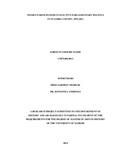| dc.description.abstract | This study sought to establish the factors that inhibit women from participating in
competitive elective parliamentary politics in Nyamira County. The study focused on
the role that economic, educational and socio-cultural factors play in shaping the
participation of women in competitive elective politics in Nyamira County.
The study was conducted among sixty respondents in the county. In addition, twelve
key informants were interviewed and one focused group discussion held in each of the
four constituencies that make Nyamira county. Data from the respondents was
collected using questionnaires, key informant interview guide and focused group
guide. The study also used secondary data from books, articles published in journals
and periodicals, unpublished articles and newspapers. Three methods of sampling
techniques were used; stratified, purposive and snowball sampling techniques to get a
sample that was representative from the four constituencies.
The study was guided by two theories; the feminist theory and the theory of change
and continuity. According to the feminist theory the discrepancies in the decision
making in societies emerge from a social framework that espouses inequality. The
premise of the feminist school of thought is that in a majority of social settings,
patriarchy is an overriding scenario whereby males are the predominant wilders of
wealth and power which determines the direction of societal operations. Thus, they
consciously or unconsciously engage in behaviours that maintain this control. On the
other hand, the central argument in the theory of change and continuity is that
situations change over time, while at the same time people’s attitudes and responses
also change. Merton argues that adaptations take the form of conformity and
innovation. This theory was useful since the study was concerned with political
changes in women representation in Nyamira County.
The study findings show that participation of women in competitive elective
parliamentary politics is influenced by a number of factors that range from socioeconomic
factors, cultural stereotyping and the nature of political parties to religion.
The study established that socio-cultural factors, such as personal attributes, age,
marital status and family background of the individual, played a significant role in
influencing the participation of women in parliamentary leadership. | en_US |

